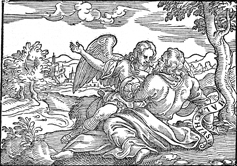Malachi: Difference between revisions
(Created page with "{{Template:Malachi}}") |
No edit summary |
||
| Line 1: | Line 1: | ||
[[File:malachi.jpg|thumb|Malachi, a Levite "messenger of YHWH".]] | |||
This prophesy seems to have occurred after Haggai and Zechariah around 420 BCE or at least after 516 BCE and the second return of Nehemiah from Persia ([[Nehemiah 13]]:6.) | |||
Malachi has been designated as a Levite member of the "Great Synagogue". The Hebrew word mal'akhi, signifies "my messenger" or "messenger of YHWH" and may not be the proper name of the author. While some traditions ascribe the book to Zerubbabel and Nehemiah the Targum, an originally spoken translation of the Hebrew Bible, reads, "by the hand of my angel, whose name is called Ezra the scribe." | |||
We should also mention that the term angel may mean a messenger from the spiritual realm we call heaven. That may be someone from our own realm that has a message or someone from that other realm who brings a message into our own earthy realm. So this reference to mal'akhi may simply be designating that what is written is recognized as a messenger. Even the name Ezra<Ref>{{05830}}</Ref> simply means "help" and presumably a messenger is sent to help. Also name were commonly changed as an individual changes as we see with the name Issac and Israel or Abram who became [[Abraham]] and may have been Bramina in earlier times. | |||
Rabbis have said "Malachi describes a priesthood that is forgetful of its duties, a Temple that is underfunded because the people have lost interest in it, and a society in which Jewish men divorce their Jewish wives to marry out of the faith."<Ref>Rabbi W. Gunther Plaut, "Haggai, Zechariah and Malachi: [https://www.myjewishlearning.com/article/haggai-zechariah-and-malachi-back-in-the-land/ Back in the Land"]</Ref> But also talks about reconciliation to the way of God and a return to the mutual respect of Parent and children. | |||
{{Template:Malachi}} | {{Template:Malachi}} | ||
{{Template:Bible Books}} | |||
{{Template:Nav-Audio}} | |||
Revision as of 01:09, 27 December 2020

This prophesy seems to have occurred after Haggai and Zechariah around 420 BCE or at least after 516 BCE and the second return of Nehemiah from Persia (Nehemiah 13:6.)
Malachi has been designated as a Levite member of the "Great Synagogue". The Hebrew word mal'akhi, signifies "my messenger" or "messenger of YHWH" and may not be the proper name of the author. While some traditions ascribe the book to Zerubbabel and Nehemiah the Targum, an originally spoken translation of the Hebrew Bible, reads, "by the hand of my angel, whose name is called Ezra the scribe."
We should also mention that the term angel may mean a messenger from the spiritual realm we call heaven. That may be someone from our own realm that has a message or someone from that other realm who brings a message into our own earthy realm. So this reference to mal'akhi may simply be designating that what is written is recognized as a messenger. Even the name Ezra[1] simply means "help" and presumably a messenger is sent to help. Also name were commonly changed as an individual changes as we see with the name Issac and Israel or Abram who became Abraham and may have been Bramina in earlier times.
Rabbis have said "Malachi describes a priesthood that is forgetful of its duties, a Temple that is underfunded because the people have lost interest in it, and a society in which Jewish men divorce their Jewish wives to marry out of the faith."[2] But also talks about reconciliation to the way of God and a return to the mutual respect of Parent and children.
Malachi | Malachi 1 | Malachi 2 | Malachi 3 | Malachi 4
Preceded by: Zechariah - Followed by: Matthew
Bible |
Bible Index |
Bible References |
Biblical bunch |
Sophistry |
Modern Christians |
Whosoever believeth |
Religion |
Bible_terms |
Early non Bible authors
Athenagoras of Athens | Methodius of Olympus | Theophilus or Ignatius of Antioch
Hippolytus of Rome | Justin the Martyr | Jerome | Augustine of Hippo |
Epistle of Mathetes | Gospel of James | The Gospel of Thomas |
Philo Judaeus or Philo of Alexandria and The Allegories of the Sacred Laws
Polybius | Plutarch | Seneca | Tacitus | Suetonius |
Marcus Tullius Cicero | Celsus | Diotrephes |
People in the Bible
Paul the Apostle |
Melchizedek |
Moses |
Cain |
Caesar |
Herod |
Jesus |
John the Baptist |
Matthew |
Mark |
Luke |
John |
Nimrod |
Abraham |
Essenes |
Pharisees |
Sadducees |
Zealots |
Julius Caesar | Augustus Caesar | Tiberius | Nero |
Historical People
Buddha |
Constantine |
Eusebius |
Ambrose |
Augustine of Canterbury |
Lady Godiva |
Vespian |
Diocletian |
Manichaeism |
John Wycliffe |
Audio and Video Archives
2024 |
2023 |
2022 |
2021 |
2020 |
2019 |
2018 |
2017 |
2016 |
2015 |
2014 |
2013 |
2012 |
2011 |
2010 |
Misc |
AllAud |
Broadcasts |
Books |
Bible |
Videos |
YouTube
Keys of the Kingdom Audio Archive
- ↑ 05830 עֶזְרָא ‘Ezra’ [ez-raw’] a variation of 05833; n pr m; [BDB-740b] [{See TWOT on 1598 @@ "1598a" }] AV-Ezra 22; 22 Ezra= "help"
- 1) the priest and scribe who led the reforms of the returned exiles in Jerusalem; co-worker with Nehemiah
- 2) a priest with Zerubbabel
- 3) another post-exilic Jew
- ↑ Rabbi W. Gunther Plaut, "Haggai, Zechariah and Malachi: Back in the Land"